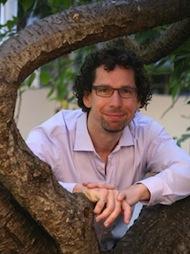San Francisco and Napa: Rebirth and Demise
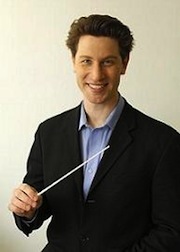 Good news from the San Francisco Lyric Opera, not so about the Napa Valley Symphony.
Good news from the San Francisco Lyric Opera, not so about the Napa Valley Symphony.
Lyric Opera
San Francisco Lyric Opera, a small but ambitious company that came out of nowhere in 1996 and aspired to become the city’s “second company,” gave in to financial pressure in 2009 when Artistic Director Barnaby Palmer “suspended operations, effective immediately, because of lack of funds.”Since then, Palmer has been doing some serious globe-trotting, currently serving as Iván Fischer’s assistant conductor with the Budapest Festival Orchestra. After this month’s tour all over Europe, Palmer will return to San Francisco to revive SFLO.
The opening production is David Lang’s Pulitzer Prize–winning The Little Match Girl Passion, based on a Hans Christian Andersen story. Performances are scheduled March 23–25 in the ODC Theater.
The cast includes Ann Moss, Celeste Winant, Eric Maggay Tuan, and Eugene Brancoveanu. Anastazia Louise of Bad Unkl Sista, a San Francisco performance art group, is in charge of costumes and choreography.
Stage director Chip Grant says of the production:
We will be performing Lang’s music as it was originally conceived: with a quartet of four soloists, doubling as percussionists throughout. Anastazia’s fusion of Butoh-style dance with Western music promises to provide a striking and new dimension to the piece and reflects San Francisco Lyric Opera’s new mission to collaborate with other art forms to bring fresh, exciting new experiences to our audiences.
Napa Valley Symphony
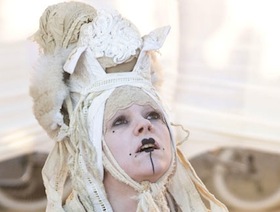 Suspension of operations at Napa Valley Symphony, complete with “exploring the wisdom of dissolving,” came late last week, as reported by the Napa Valley Register.
Suspension of operations at Napa Valley Symphony, complete with “exploring the wisdom of dissolving,” came late last week, as reported by the Napa Valley Register.
I became aware of the story after receiving e-mail from a soprano who sang there in December, and she has been “struggling to get my check,” which now is not likely to ever arrive. “I am saddened by how the arts are folding, but beyond angry at how the artists got the shaft; I had to pay over $200 for a babysitter so that I could take this job, not to mention gas for driving, etc.”
She asks: “How can we rectify this, what are the legal obligations when this happens?” and I don’t know the answers or even if there are any. Orchestra Board Chair Michael Enfield feels the same way about the whole situation: “There’s too much that’s unknown. We don’t have all the answers. I’m not sure we even have all the questions. We were dealing with the unforeseeable and the unforeseen.”
After years of up and down, frequently chronicled in this column, this is a bleak situation, especially as the determined, hardworking executive director, Richard Aldag, was laid off, along with other staff members. Aldag saw no way out: “We couldn’t continue to incur expenses with no revenue.”
Enfield cited three items that combined to create insurmountable financial problems for the 79-year-old orchestra: (1) the drying up of support for the arts during the recession that began in 2008; (2) the death last year of principal donor Donald Carr; (3) the December closing of the Lincoln Theater where the orchestra performed.
About Lincoln Theater in Yountville, see the next item.
Festival del Sole's Big Plans
 Festival Director Richard Walker has committed to keeping Lincoln Theater, the festival’s main venue open:
Festival Director Richard Walker has committed to keeping Lincoln Theater, the festival’s main venue open:
The festival’s plans have not changed — we intend to present at the Lincoln Theater — there is no alternative venue for us. Every July, the festival uses Lincoln Theater as its home base, and this year is no exception. On July 15, the festival is presenting 24-Hour Plays at Lincoln Theater, a program of extreme theater involving many actors, including Liev Schreiber, Naomi Watts, Chris Noth, Hugh Dancey and Matthew Modine.On July 20, the Bolshoi Ballet will be appearing there, for the first time in Lincoln Theater, and on July 21, Joshua Bell and Hélène Grimaud will perform at Lincoln Theater with the Russian National Orchestra conducted by Kristjan Järvi.
Lincoln Theater is also the rehearsal venue for Festival del Sole performances taking place at other locations around Napa Valley, including Castello di Amorosa, Jarvis Conservatory and the Napa Valley Opera House.
We are working tirelessly to ensure Lincoln Theater is open for festival events this July. Lincoln Theater is the only theater in Napa Valley with a stage large enough for performances of this scope and magnitude. There is no alternative venue. Commitments were made long ago for these performances, and the United States and Russian governments are involved in making them possible.
Festival del Sole brings much to Napa Valley, including employment, revenue to hotels, restaurants and merchants, and world-class performances. We are confident the California Department of Veterans Affairs will collaborate with us to provide these benefits to the community.
Rohde Wins Lydian Quartet Commission Prize
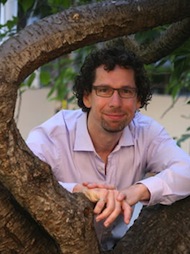
Photo by Ben Janken
Rohde told Music News that the prize is especially welcome, as “Somehow it feels like the right time for me to compose a string quartet more than ever.”
A founder of the Left Coast Chamber Ensemble and member of numerous local orchestras, Rohde has been on an award and grant binge of more than a decade, including a Guggenheim Fellowship, the Berlin and Rome prizes, the Charles Ives Fellowship from the American Academy of Arts and Letters, and many more. His previous commission awards include the Koussevitzky Foundation of the Library of Congress, the Fromm Foundation of Harvard University, and the Barlow Endowment for Music Composition.
Rohde said, “When I saw the Lydians were sponsoring the competition, I wanted to enter because I felt it was time for me to really try and compose a string quartet ... and I especially wanted to compose a new work for them. I am elated to win this prize.”
The competition was anonymous, and when the Lydians chose the winner, they were delighted to have selected an old friend: “It was an utter shock to us that Kurt was the winner,” said Lydians violist Mary Ruth Ray, chair of the music department at Brandeis. “It shows the affinity that we have for his work. He clearly understands strings and string instruments.”
Each of six first-round judges chose up to three works, which were forwarded to the members of the Lydian for final judging. They then listened to CDs from the 17 finalists before reaching a unanimous decision to award the prize to Rohde.
Rohde says he is “thinking of writing a piece that might focus on musical interests of the particular players. I know Dan [Stepner, first violinist] is interested in early music and Judy [Eissenberg] is interested in music from Asia. That will play into the piece directly or obliquely.”
Afiara Quartet at Kohl Mansion
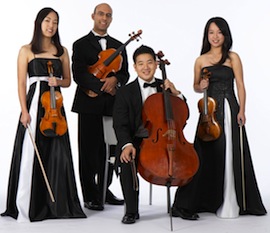 Music at Kohl Mansion’s 29th season continues with the Afiara String Quartet on March 18. The program includes Haydn’s Quartet in F Major, Op. 74, No. 2; Sibelius’ Quartet in D Minor, Op. 56, Voces Intimae; and Carl Nielsen’s Quartet No. 4 in F Major, Op. 44.
Music at Kohl Mansion’s 29th season continues with the Afiara String Quartet on March 18. The program includes Haydn’s Quartet in F Major, Op. 74, No. 2; Sibelius’ Quartet in D Minor, Op. 56, Voces Intimae; and Carl Nielsen’s Quartet No. 4 in F Major, Op. 44.
The all-Canadian quartet is winner of the 2008 Concert Artists Guild International Competition, the 2010 Young Canadian Musicians Award, and top prizes at the Munich ARD International Music Competition and the Banff International String Quartet Competition, where the quartet also took the Székely Prize for best Beethoven interpretation.
Formed in 2006, the quartet takes its name from the Spanish fiar, meaning “to trust — a basic element vital to the depth and joy of its music-making.” The quartet consists of violinists Yuri Cho and Valerie Li, violist David Samuel, and cellist Adrian Fung.
Last year, the Afiara completed a two-year tenure as graduate resident string quartet at the Juilliard School, where they served as teaching assistants to the Juilliard String Quartet. Prior to that, they were the Morrison Fellowship Quartet-in-Residence at San Francisco State University’s International Center for the Arts, serving as teaching assistants to their mentor ensemble, the Alexander String Quartet.
Partial R.I.P. for Keeping Score
The splendid MTT/SFS Keeping Score program — nine one-hour documentaries, eight live concerts on PBS television and on DVDs, and an NPR national radio series — remains available, but there are no plans to continue the project in its current form.Reasons for the decision include the high cost of producing the episodes and declining classical music audiences on public television. San Francisco Symphony administrators are exploring new ways of carrying on the mission of the project. This is the program’s discography:
Tchaikovsky, Symphony No. 4
Beethoven, Symphony No. 3
Copland and the American Sound
Stravinsky, Rite of Spring
Berlioz, Symphonie fantastique
Shostakovich, Symphony No. 5
Ives, Holiday Symphony
Mahler: Origins and Legacy (two episodes)
Will Show Boat Dock at the War Memorial?
Lisa Hirsch has been putting 2 and 2 together, coming up with the conclusion that San Francisco Opera General Director David Gockley may be preparing the way for Show Boat, the Kern–Hammerstein musical:For 35 I’ve maintained that the classic works of the American musical theater are fit to be in the repertoire of opera houses. In many ways they are our opera. Many were composed for “legit,” unamplified voices, with sizable choruses, orchestras, and dancers.She points at the Out West Arts review:
A musical production for an opera company can be viewed as a way of filling houses and bringing in audiences that would never dream of buying a ticket to Aida. And whether or not this was a primary motivation for this current production, which will also travel to San Francisco, Washington, and Houston, it undoubtedly looks like it will be successful in doing so.The production, directed by (San Francisco Opera Artistic Adviser) Francesca Zambello, was playing at Lyric Opera of Chicago. There is a chance that it may be presented by the SHN organization here, but the Opera House remains a strong possibility. Hmmmm. And nothing from Sondheim?!
Meanwhile, across Grove Street, MTT is trying to figure out what kind of West Side Story to present next season: “operatic” or “Broadway”? At the press event where this was discussed on Friday, he showed clear preference for the latter. As he should. Anyone for Kiri as Maria?
Aeron Flutes Celebrate, Play, and Mingle
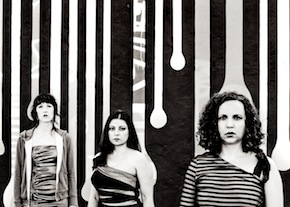 Areon Flutes are celebrating the release of their first full-length CD, titled Gossip Cats Are Dancing, on March 18 in the Bryant Street Gallery in Palo Alto. They will be performing works from the CD, as well as “mingling with their guests, and look forward to sharing the new works they’ve recorded.”
Areon Flutes are celebrating the release of their first full-length CD, titled Gossip Cats Are Dancing, on March 18 in the Bryant Street Gallery in Palo Alto. They will be performing works from the CD, as well as “mingling with their guests, and look forward to sharing the new works they’ve recorded.”
Areon consists of Kassey Plaha, Amelia Vitarelli, and Jill Heinke. Gossip Cats has Robert Dick’s F Bass Flute improv solo (with Dick as soloist), and Eyewitness, also by Dick; Four Elements by Chia-Ying Chiang, winner of Areon’s International Chamber Competition; and Train Dreams (four elements remix) and One Tree Catching Light, both written by Michael Sempert, the lead singer of the popular San Francisco indie rock band Birds and Batteries.
Areon Flutes made its 2007 debut in Carnegie Hall’s Weill Hall, and was the first flute ensemble to medal at the Fischoff Chamber Music Competition, in 2008.
Lieder Alive Comes to Life
Maxine Bernstein’s Lieder Alive is presenting mezzo Katharine Tier, accompanied by John Parr, on March 9 in San Francisco, at Salle Pianos, on Market Street, between Franklin and Gough. The program includes works by Brahms and Strauss, plus Mahler’s Kindertotenlieder.Both singer and pianist are veterans of the San Francisco Opera, where Tier was a Merola Progam participant and an Adler Fellow, and Parr, who is now assistant music director at the Badisches Staatstheater in Karlsruhe, was head of music staff.
Of Dudamel's Mahler
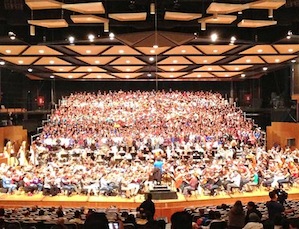 To get away from possible Southland bias about Gustavo Dudamel’s just-concluded Mahler marathon, I turned to the other coast and a respected friend, Guy Fairstein, vice president of the Gustav Mahler Society of New York. He writes:
To get away from possible Southland bias about Gustavo Dudamel’s just-concluded Mahler marathon, I turned to the other coast and a respected friend, Guy Fairstein, vice president of the Gustav Mahler Society of New York. He writes:
I attended the filmed reprise of the Mahler Symphony No. 8 in Caracas, in which the LA Philharmonic joined with the Simon Bolivar Symphony Orchestra of Venezuela.I could have done without the too-long introductions, yet pieces from them came back into focus and contributed to my enjoyment of the evening.
I thought the Mahler 8 performance very impressive. The first sight of the massed choirs on stage on their risers was staggering, for their sheer number. The opening organ chord followed by the entry of the huge choruses sent a shiver up my spine. The performance took my least favorite Mahler symphony and revealed it to me as a magnificent work. I have been at two or three concert Mahler Eighths, and have watched and listened to several others on DVD and CD. Finally I think I “got it.”
For a work I imagined must be so difficult to conduct because of the sheer numbers, Dudamel made it look easy. The preparation must have been hell. Interesting thing about the preparation: The youth choirs sang with scores in hand. The children’s choir members had no scores. So well prepared were these youngsters that in the close-ups they could be seen with their mouths shaping every word and singing their hearts out.
This was one point with which the introduction provided a helpful note. Every “nucleo” in El Sistema must have a children’s orchestra and a youth orchestra, a children’s chorus and a youth chorus. The work and preparation of the young musicians and choristers, and their development up the pyramid to the top performance level, shows in the final product.
Again from the intro: a trumpeter from the LA Phil asked someone in El Sistema how they make the cut, eliminating those without talent. “I don’t understand the question.” There is no cut. Everyone who wants to will play at some level. Choristers who are hearing-impaired or even deaf wear white gloves in performance and sign the words. Not with the highest level choirs, not here, but all will perform at some level.
The same LA Phil trumpeter marveled at the technical perfection of the young Venezuelan brass players. There seemed to be a young Venezuelan musician seated next to each LA Phil musician. Exposed solo passages were given at least to the trumpet principal from Caracas (on a rotary valve instrument, which I associate with Berlin and Vienna) and to a young Venezuelan woman on the flute.

